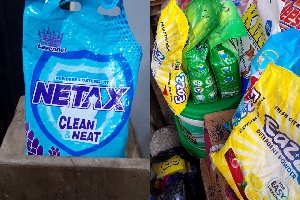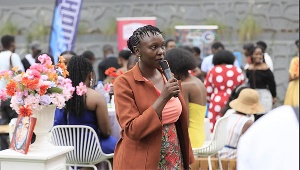- Home - News
- Elections 2024
- News Archive
- Crime & Punishment
- Politics
- Regional
- Editorial
- Health
- Ghanaians Abroad
- Tabloid
- Africa
- Religion
- Photo Archives
- Press Release
General News of Thursday, 5 June 2025
Source: www.ghanawebbers.com
JoyNews uncovers Chinese firms sold millions of washing detergents without GSA certification
JoyNews investigations have uncovered that some Chinese-owned companies sold millions of kilograms of washing detergents in Ghana without certification from the Ghana Standards Authority (GSA).
In 2022, the Ghana Free Zones Authority (GFZA) granted tax incentives to Ghana Sino Border Industrial Company. The company was supposed to manufacture detergents for export only. However, it sold a large volume of its products locally, violating the agreement.
Documents show that in September 2022, the GFZA Board approved the company's application. The approval allowed production of washing powder and diapers strictly for export. Under the Free Zones Act, such companies receive significant benefits like 100% exemptions from import duties and income tax holidays.
Tax Policy Analyst Benaiah Nii Addo stated that the Free Zones policy aims to drive industrialization and economic growth. He emphasized it should not give foreign companies an unfair advantage over local manufacturers.
JoyNews found that Ghana Sino Border Industrial Company did not export all its detergent. In 2023, it imported 6,045,448 kilograms but exported only 4,021,254 kilograms worth $2.5 million. The remaining 2,023,600 kilograms were sold on the Ghanaian market.
This breach violates Free Zones provisions and allowed the company to enjoy tax exemptions on locally sold goods. In 2024, they imported 4,719,198 kilograms but exported just 792,815 kilograms by January 14.
Market surveys revealed that their detergent brand Netax sells for GH¢15. Locally produced alternatives cost GH¢35. Industry players argue this pricing is harming local businesses.
Tsonam Akpeloo from the Association of Ghana Industries blamed legal loopholes in the Free Zones regime. He said these loopholes give foreign companies an undue advantage over local producers who pay full taxes.
Further checks at GSA showed that while GFZA approved production for export in 2022, Ghana Sino Border Limited did not receive GSA certification until 2024 for local sales of its Netax and Nice One brands. This indicates that about two million kilograms sold locally in 2023 were unlicensed.
The company's earlier certifications were for plastic products and textiles—not detergents.
When JoyNews contacted them for an interview, they declined but admitted to selling some products locally. They claimed the Free Zones Act allows up to 30% local sales and insisted they had GSA certificates valid until June 2023.
Meanwhile, another Chinese-owned producer called Meiji Ghana Limited also appears to be selling illegally in Ghana. It imported over nine million kilograms of detergent in 2023 without exporting any.
In 2024, Meiji imported over six million kilograms but exported only a small amount valued at $218,822. The GSA confirmed Meiji is not certified to sell locally either.
AGI’s Tsonam Akpeloo believes it's time for government action against such practices. Although exact tax revenue losses are unclear, JoyNews has petitioned the Ghana Revenue Authority (GRA) for a tax audit of both firms; sources say this process has begun.
While designed to attract foreign investment, abuse of Free Zones provisions may drain critical revenue needed by communities lacking basic amenities.
One affected community is Chorkor in Accra where residents struggle with access to public toilets. Many find paying GH¢1 too costly leading to open defecation along beaches.
Local mobile money vendor Allotey Pappoe says this fee impacts his daily earnings significantly. Chief Fisherman Lantey Wulo expressed concern about health risks associated with open defecation despite his pleas for change going unheard.
Open defecation poses serious health risks globally and has affected Ghana significantly as well; recent reports indicated new cholera cases and deaths between October and November last year.
Local Assembly Member Theophilus Quaye campaigns for better sanitation in Chorkor but hopes remain low due to no new toilet facilities being built.
Efforts to get a response from Meiji Ghana Limited were unsuccessful.
This investigation was supported by the Thomson Reuters Foundation as part of efforts to strengthen informed societies worldwide; views expressed are solely those of the author.











